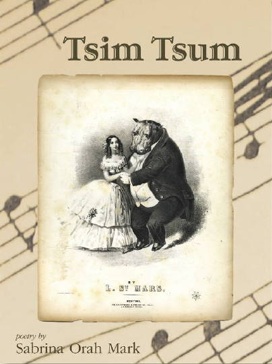Sabrina Orah Mark: Tsim Tsum
"The Departure," the first poem in Sabrina Orah Mark’s second book, Tsim Tsum, begins with words that set the stage for the rest of the book: "’You do not know anymore,’ sighed Walter B., ’what is real.’" This statement – part accusation, part admission of despair – and its attendant sigh form the emotional core of the book. Tsim Tsum, which consists of forty-seven prose poems split into nine sections, follows Walter B. and Beatrice as they attempt to navigate and define a baffling world. Walter B. and Beatrice are not quite human, and their world is not quite our world, though their quest and questions resonate.
Mark’s frequent use of repetition, both within and across poems, creates a sense of stasis. In "The Departure," which has the densest repetition in the book, Walter B. repeatedly says "Goodbye" and explains he is going "to the banquet," though he never actually leaves. Rather, Walter B. and Beatrice repeat the same conversation over and over, so that the poem ends in the same place it began:
"Goodbye," said Walter B. "Where will you go?" asked Beatrice. "To the banquet," said Walter B. Walter B. and Beatrice stood in the dark. They held hands and watched the wagons pass by. Walter B. was not in any of them. "Goodbye," said Beatrice. "Goodbye," said Walter B. "Goodbye," said Beatrice. "Goodbye," said Walter B.
Though this repetition could quickly become tiresome, brief moments of surreality create levity and tenderness. After Walter B.’s first "goodbye," Beatrice "wished he would break like the sky did once and drown her in flowers," then goes on to say "’Weren’t we once,’ asked Beatrice softly, ’a little like a banquet?’" This question would likely seem sentimental in a different context, but against the repetitive structure of the rest of the poem, Beatrice’s wistful question becomes poignant.
Elsewhere, Mark plays with idiom and cliché to a slightly more comic effect. In "Beatrice Takes a Lover," after Beatrice has made her announcement, Walter B. responds, "’And where exactly,’ asked Walter B., fussing with his fur collar, ’will you be taking this lover?’" Later, "Where Babies Come From" takes up the age-old question, but with a different response: "’Basically,’ said Walter B., ’babies come from rubbing babies together.’" The opening line of "The Joke" plays with idiom, explaining that "What didn’t kill Beatrice that winter made her funnier." Mark’s wordplay heightens the contrast between the banal and the surreal. Poems that begin with moments of lightness often take a darker turn, as in "The Joke," which ends on an ominous note: "Even Walter B. knew it was too soon to tell how this joke would end." .
A certain kind of surrealism has become almost a given among young poets, and Tsim Tsum occasionally falls into the trap of language that’s too self-consciously clever. (Mark sometimes tips her hand with discordant adjectives and adverbs that declare their quirkiness a bit loudly.) Despite these few off-key moments, Walter B. and Beatrice’s world is engaging and enjoyable.
 Sabrina Orah Mark
Sabrina Orah Mark